Đề thi vào lớp 6 môn Tiếng Anh trường Amsterdam năm 2019Tải vềChoose the word whose the main tress is different from the others. Choose the word whose the underlined part is differently pronounced from the others. Quảng cáo
Lựa chọn câu để xem lời giải nhanh hơn
Tải về
Đề bài I. PHONETICS 1.1. Choose the word whose the main tress is different from the others.
1.2. Choose the word whose the underlined part is differently pronounced from the others.
II. READING COMPREHENSION 2.1. Read the text below and decide which answer A, B, C, or D fits each space. People in many countries grow fresh water fish from eggs. They move the small fish into lakes and rivers. The fish live and (1)___________there. People go (2) ___________in these lakes and rivers. They enjoy catching fish because fish is also good food. Now the Japanese grow salt water fish. Most of them are yellow tail fish. Workers grow the fish from eggs. Every time they feed the fish, they play (3)_________ of piano music. The fish (4) __________that piano music means food. When the fish are small, the Japanese put them into the ocean near the land. The fish find some of their (5)___________food. Workers also feed them. They play the same piano music. The fish (6)__________ know the music. They swim toward it and (7)__________the food. In (8) _________ months the fish are large. The Japanese play the same music. The fish swim toward it and the workers (9) __________them. The Japanese get about 15 percent of their seafood (10) __________farms in the ocean.
2.2. Read the following passage and mark the letter A, B, C, or D to indicate the correct answer to each of the questions. Past explorers have made vast contributions to our knowledge of the world today. They braved the oceans to discover the world and to bring their goods to other countries to trade. Many explorers had to overcome their fear of the unknown to travel around the world on their sailing ships. Submitting themselves to unpredictable weather conditions, each explorer either traveled further than his predecessor or tried to find a different route to already discovered countries. For example, Vasco Da Gama, a Portuguese explorer, established a sea route from Europe to India. He had extended the sea route that Bartolomeu Dias had already done when he latter sailed around the Cape of Good Hope in southern Africa. More importantly, explorers first closed the gap between the east and the west by trading their local goods with foreign ones. India was known for its spices such as nutmeg and cinnamon while China was known for its silk. A part of the east was brought to the west when western gourmets developed a taste for eastern spices in their food. People in the east dressed in clothes that were previously only worn in the west. Without the explorers, many of us would still be living in our own enclave with little knowledge of the vast world and what other foreign countries have to offer us. 1. Past explorers contributed to our knowledge of the world by ___________. A. making new good B. selling their goods at high prices C. travelling to other countries D. spending time reading about foreign countries 2. Past explorers were probably fearful of ___________. A. swimming in the ocean B. the dangers that lurked in unexplored places C. being in their sailing ships for a long time D. tying to predict the weather conditions 3. Explorers who traveled to countries that others had already been to would make sure that they _______. A. sold new goods to those countries B. bought new goods from those countries C. explored new areas in the countries D. found another way of going to those countries 4. The act of selling their local goods to a foreign country allowed the explorers to _______. A. earn more money B. think about visiting other countries as well C. grow different types of spices D. find out more about that country 5. Based on the third paragraph, the _________ of people changed when they came into contact with foreigners. A. clothing and lifestyle B. speech and lifestyle C. clothing and jobs D. family structure and clothing III. GRAMMAR AND VOCABULARY 3.1. Choose the best option to complete the sentences. 1. The ticket machine in the station was out of ......... so I couldn't buy a ticket for my train.
2. ............ a complete mystery how they ever got there in that car.
3. We had so many problems with the car that ..............sold it and bought a new one.
4. I did not agree with the decisions the ..............made last night. We lost the game because of him.
5. His parents think it is time he............married.
6. I had to...........early last morning because I was going to board a ferry but I had to wait to check out.
7. Before entering the room you'd better........ your shoes.
8. They saw bright...............the sky during the storm.
9. I regret to inform you that you............for this post has not been successful.
10. Lack of funds prevented him from.............with his study.
3.2. Put the correct form of words. 1. I would be grateful if you could tell me something about the pay and the possibilities of _________ (PROMOTE) 2. Sheila is very _________ (PROFESSION). She turns up on time, works hard and does a good job. 3. People are _________ (CONFUSE) about all the different labels on food these days. 3.3. Synonyms and antonyms Mark the letter A, B, C or D on your answer sheet to indicate the word(s) CLOSEST in meaning to the underlined word(s) in each of the following questions. 1. Many scientists agree that global warming poses great threats to all species on Earth.
2. When their rent increased from 200 to 400 a month, they protested against such a tremendous increase.
Mark the letter A, B, C or D on your answer sheet to indicate the word(s) OPPOSITE in meaning to the underlined word(s) in each of the following questions. 1. Punctuality is imperative in your new job.
2. We’d better speed up if we want to get there in time.
3.4. CONVERSATION 1. Jim: "What about collecting used paper, bottles and plastic bags everyday?" Ha and Mai: “___________” A. Because they can pollute the environment. B. How come? Who can do that? C. That's a very good idea. Let's do that. D. What about this weekend 2. Phuong: "I'm taking my TOEFL test tomorrow" Daisy: “___________” A. Good fortune B. Good luck C. Good outcome D. Good success IV. WRITING 4.1. Rewrite the sentences without changing their meaning using the given words. 1. She started working as a secretary five years ago. (FOR) _______________________________________________________________________ 2. "Don't forget to phone the office," she told him. (REMINDED) _______________________________________________________________________ 3. The furniture was so expensive that I didn't buy it. (TOO) _______________________________________________________________________ 4. You may get hungry on the train, so take some sandwiches. (CASE) _______________________________________________________________________ 5. I would like you to help me to put the chairs away. (MIND) _______________________________________________________________________ 4.2. Write a meaningful sentence using given words. 1. We / should / stop / destroy / forests / because / they / important / environment / _______________________________________________________________________ 2. She / suggest / go / for / walk. _______________________________________________________________________ 3. I / be / write / tell / you / my holiday / here / Ha Long. _______________________________________________________________________ 4. She / looking forward / see / boyfriend / again. _______________________________________________________________________ 5. Life expectancy / craft village residents / be /lower / rest of Vietnam/ _______________________________________________________________________ 4.3. Write a paragraph (about 120 – 150 words) about the topic (12pts) Tell a memorable success you have achieved in your life. _______________________________________________________________________ _______________________________________________________________________ _______________________________________________________________________ _______________________________________________________________________ _______________________________________________________________________ _______________________________________________________________________ _______________________________________________________________________ _______________________________________________________________________ Đáp án
Lời giải LỜI GIẢI CHI TIẾT I. PHONETICS 1.1. Choose the word whose the main tress is different from the others. (Chọn đáp án có trọng âm khác với những từ còn lại.) 1. B promotion /prəˈməʊ.ʃən/ engineering /ˌen.dʒɪˈnɪə.rɪŋ/ divorce /dɪˈvɔːs/ impossible /ɪmˈpɒs.ə.bəl/ => Chọn B vì có trọng âm rơi vào âm tiết thứ 3, các từ còn lại đều có trọng âm rơi vào âm tiết thứ 2. 2. D active /ˈæk.tɪv/ serious /ˈsɪə.ri.əs/ selfish /ˈsel.fɪʃ/ announcement /əˈnaʊns.mənt/ => Chọn D vì có trọng âm rơi vào âm tiết thứ 2, các từ còn lại đều có trọng âm rơi vào âm tiết đầu. 1.2. Choose the word whose the underlined part is differently pronounced from the others. (Chọn từ có phần gạch chân được phát âm khác với những từ còn lại.) 1. B arrival /əˈraɪ.vəl/ (n): sự đến nơi, đến địa điểm nào đó champion /ˈtʃæm.pi.ən/ (n): nhà vô địch, quán quân athletics /æθˈlet.ɪks/ (n): các môn điền kinh accountant /əˈkaʊn.tənt/ (n): kế toán 2. A surgeon /ˈsɜːdʒən/ (n): bác sĩ phẫu thuật underground /ˌʌndəˈɡraʊnd/ (adj): dưới lòng đất interrupt /ˌɪntəˈrʌpt/ (v): ngắt lời button /ˈbʌtn/ (n): nút, công tắc => Chọn A vì phần gạch chân của từ này được phát âm là /ɜː/, khác với những từ còn lại có phần gạch chân được phát âm là /ʌ/. II. READING COMPREHENSION 2.1. Read the text below and decide which answer A, B, C, or D fits each space. (Đọc đoạn văn và chọn một đáp án đúng trong A, B, C hoạc D để điền vào chỗ trống.) 1. D bred (dạng quá khứ của breed) (v): (động vật) sinh sản born (v): được sinh ra (chỉ có thể dùng ở thể bị động nếu không có by theo sau) grow (+ up) (v phr.): lớn lên, phát triển develop (v): phát triển 2. B Go fishing (v phr.): đi câu cá 3. C tapes of piano music: những đoạn băng nhạc dương cầm 4. C think (v): suy nghĩ recognize (v): nhận ra (vì đã biết trước đó) realize (v): nhận ra (một cách vô thức) learn (v): học Chủ ngữ câu này là “the fish” nên ta chọn realize là hợp lý nhất. 5. A their own food: thức ăn của riêng chúng 6. D The fish already know the music. (Những con cá đã biết loại nhạc này trước đó.) 7. B They swim toward it and find the food. (Chúng bơi về phía đó và tìm thấy đồ ăn.) 8. B In a few months the fish are large. (Chỉ trong vài tháng những con cá đã lớn.) 9. B grasp (v): chộp lấy catch (v): bắt lấy seize (v): nắm, giữ lấy (cơ hội) hold (v): giữ lấy 10. C Get something from something: nhận được gì từ cái gì Đoạn văn hoàn chỉnh: People in many countries grow fresh water fish from eggs. They move the small fish into lakes and rivers. The fish live and develop there. People go fishing in these lakes and rivers. They enjoy catching fish because fish is also good food. Now the Japanese grow salt water fish. Most of them are yellow tail fish. Workers grow the fish from eggs. Every time they feed the fish, they play tapes of piano music. The fish realize that piano music means food. When the fish are small, the Japanese put them into the ocean near the land. The fish find some of their own food. Workers also feed them. They play the same piano music. The fish already know the music. They swim toward it and find the food. In a few months the fish are large. The Japanese play the same music. The fish swim toward it and the workers (9) catch them. The Japanese get about 15 percent of their seafood from farms in the ocean. Tạm dịch: Người dân ở nhiều quốc gia nuôi cá nước ngọt từ trứng. Họ mang những con cá nhỏ vào hồ và sông. Cá sống và phát triển ở đó. Mọi người đi câu cá ở những hồ và sông này. Họ thích bắt cá vì cá cũng là thức ăn ngon. Bây giờ người Nhật nuôi cả cá nước mặn. Phần lớn là cá đuôi vàng. Công nhân nuôi cá từ trứng. Mỗi lần cho cá ăn, họ mở băng phát nhạc dương cầm. Con cá nhận ra rằng âm nhạc dương cầm có nghĩa là thức ăn. Khi cá còn nhỏ, người Nhật thả chúng ra biển gần đất liền. Những con cá tìm thấy một số thức ăn của riêng chúng. Công nhân cũng cho chúng ăn. Họ chơi cùng một bản nhạc piano đó. Những con cá đã biết loại âm nhạc này trước đó. Chúng bơi về phía đó và tìm thức ăn. Chỉ trong vài tháng cá đã lớn. Người Nhật lại bật một loại nhạc. Con cá bơi về phía họ và những nguoiwg công nhân bắt lấy chúng. Người Nhật thu về được khoảng 15% sản lượng hải sản của họ từ các trang trại trong đại dương. 2.2. Read the following passage and mark the letter A, B, C, or D to indicate the correct answer to each of the questions. (Đọc đoạn văn sau và đánh dấu các chữ cái A, B, C hoặc D để chọn đáp án đúng cho mỗi câu hỏi.) Past explorers have made vast contributions to our knowledge of the world today. They braved the oceans to discover the world and to bring their goods to other countries to trade Many explorers had to overcome their fear of the unknown to travel around the world on their sailing ships. Submitting themselves to unpredictable weather conditions, each explorer either traveled further than his predecessor or tried to find a different route to already discovered countries. For example, Vasco Da Gama, a Portuguese explorer, established a sea route from Europe to India. He had extended the sea route that Bartolomeu Dias had already done when he latter sailed around the Cape of Good Hope in southern Africa. More importantly, explorers first closed the gap between the east and the west by trading their local goods with foreign ones. India was known for its spices such as nutmeg and cinnamon while China was known for its silk. A part of the east was brought to the west when western gourmets developed a taste for eastern spices in their food. People in the east dressed in clothes that were previously only worn in the west. Without the explorers, many of us would still be living in our own enclave with little knowledge of the vast world and what other foreign countries have to offer us. Tạm dịch: Những nhà thám hiểm trong quá khứ đã có những đóng góp to lớn cho kho tàng tri thức của nhân loại ngày nay. Họ đã vượt đại dương để khám phá thế giới và mang hàng hóa của họ đến các quốc gia khác để buôn bán. Nhiều nhà thám hiểm đã phải vượt qua nỗi sợ hãi về những điều bí ẩn để đi vòng quanh thế giới trên những chiếc thuyền buồm của họ. Dấn thân vào những điều kiện thời tiết không thể đoán trước, mỗi nhà thám hiểm hoặc đi xa hơn người tiền nhiệm hoặc cố gắng tìm một con đường khác đến các quốc gia đã được khám phá trước đó. Ví dụ, Vasco Da Gama, một nhà thám hiểm người Bồ Đào Nha, đã thiết lập một con đường biển từ Châu Âu đến Ấn Độ. Ông đã mở rộng tuyến đường biển mà Bartolomeu Dias đã tìm ra khi mà sau đó anh ấy đi thuyền quanh Mũi Hảo Vọng ở miền nam Châu Phi. Quan trọng hơn, các nhà thám hiểm đầu tiên đã thu hẹp khoảng cách giữa phương Đông và phương Tây bằng cách trao đổi hàng hóa địa phương của họ với hàng hóa nước ngoài. Ấn Độ được biết đến với các loại gia vị như nhục đậu khấu và quế trong khi Trung Quốc được biết đến với tơ lụa. Một phần của phương Đông đã được đưa đến phương Tây khi những người sành ăn phương Tây bắt đầu thích các loại gia vị của phương Đông trong thức ăn của họ. Người phương Đông cũng đã mặc trang phục mà trước đây chỉ người phương Tây mới mặc. Nếu không có những nhà thám hiểm, nhiều người trong chúng ta vẫn sẽ chỉ sống trong vùng đất của chính mình với nguồn kiến thức ít ỏi về thế giới rộng lớn ngoài kia và những gì mà các quốc gia khác mang lại cho chúng ta. 1. C Thông tin: They braved the oceans to discover the world… (Họ đã vượt đại dương để khám phá thế giới…) Many explorers had to overcome their fear of the unknown to travel around the world on their sailing ships. (Nhiều nhà thám hiểm đã phải vượt qua nỗi sợ hãi về những điều bí ẩn để đi vòng quanh thế giới trên những chiếc thuyền buồm của họ.) => Past explorers contributed to our knowledge of the world by travelling to other countries. (Những nhà thám hiểm trong quá khữ đã đóng góp cho kho tàng trí thức của nhân loại bằng cách đi đến những quốc gia khác.) 2. B Thông tin: Many explorers had to overcome their fear of the unknown to travel around the world on their sailing ships. (Nhiều nhà thám hiểm đã phải vượt qua nỗi sợ hãi về những điều bí ẩn để đi vòng quanh thế giới trên những chiếc thuyền buồm của họ.) => Past explorers were probably fearful of the dangers that lurked in unexplored places. (Những nhà thám hiểm trong quá khứ sợ những mối nguy hiểm tiềm ẩn ở những vùng đất chưa được khám phá.) 3. D Thông tin: …each explorer either traveled further than his predecessor or tried to find a different route to already discovered countries. (…mỗi nhà thám hiểm hoặc đi xa hơn người tiền nhiệm hoặc cố gắng tìm một con đường khác đến các quốc gia đã được khám phá trước đó.) => Explorers who traveled to countries that others had already been to would make sure that they found another way of going to those countries. (Những nhà thám hiểm đi đến những quốc gia mà những nhà thám hiểm khác đã từng đến sẽ chắc chắn rằng họ sẽ tìm ra một lộ trình mới để đến những nơi đó.) 4. D Thông tin: … explorers first closed the gap between the east and the west by trading their local goods with foreign ones. (… các nhà thám hiểm đầu tiên đã thu hẹp khoảng cách giữa phương Đông và phương Tây bằng cách trao đổi hàng hóa ở địa phương của họ với hàng hóa nước ngoài.) => The act of selling their local goods to a foreign country allowed the explorers to find out more about that country. (Hành động bán những hàng hóa địa phương cho một quốc giia khác cho phép các nhà thám hiểm tìm hiểu thêm về quốc gia đó.) 5. A Thông tin: A part of the east was brought to the west when western gourmets developed a taste for eastern spices in their food. People in the east dressed in clothes that were previously only worn in the west. (Một phần của phương Đông đã được đưa đến phương Tây khi những người sành ăn phương Tây bắt đầu thích các loại gia vị của phương Đông trong thức ăn của họ. Người phương Đông cũng đã mặc trang phục mà trước đây chỉ người phương Tây mới mặc.) => Based on the third paragraph, the clothing and lifestyle of people changed when they came into contact with foreigners. (Dựa vào đoạn văn thứ ba, trang phục và lối sống của mọi người thay đổi khi họ tiếp xúc với người nước ngoài.) III. GRAMMAR AND VOCABULARY 3.1. Choose the best option to complete the sentences. (Chọn đáp án đúng nhất để hoàn thành câu.) 1. A Out of order: hỏng, không hoạt động The ticket machine in the station was out of order so I couldn't buy a ticket for my train. (Máy bán vé ở trạm xe lửa bị hỏng nên tôi đã không thể mua vé cho chuyến tàu của mình.) 2. C That và this đều là những đại từ chỉ định dùng cho người, vật hiện hữu. Cấu trúc There is được dùng để nói có cái gì, đều không phù hợp trong câu này. It is a complete mystery how they ever got there in that car. (Đó hoàn toàn là một bí ẩn rằng làm cách nào mà họ vào trong chiếc xe hơi đó được.) 3. B At the end: thời điểm kết thúc của cái gì In the end: kết quả cuối cùng của tình huống By the end (+ of): vào cuối cùng của… To the end (+ of): cho đến tận cùng của… We had so many problems with the car that in the end sold it and bought a new one. (Chúng tôi đã gặp rất nhiều vấn đề với chiếc xe hơi và cuối cùng thì đã bán nó và mua cái mới.) 4. D competitor (n): đối thủ supporter (n): người ủng hộ champion (n): quán quân referee (n): trọng tài I did not agree with the decisions the referee made last night. We lost the game because of him. (Tôi không đồng ý với quyết định trọng tài đưa ra tối qua. Chúng tôi đã thua cuộc bởi do ông ấy.) 5. C It is time + S + động từ ở thì quá khứ: cần làm việc gì ngay His parents think it is time he got married. (Bố mẹ anh ta nghĩ đây là thời điểm để anh ta kết hôn.) 6. C reach (v): chạm vào, đến địa điểm nào đó unpack (v): mở ra set off: khởi hành arrive (v): đến đâu đó I had to set off early last morning because I was going to board a ferry but I had to wait to check out. (Tôi đã phải khởi hành sớm vào sáng hôm qua vì tôi phải lên phà nhưng tôi còn phải đợi để tra phòng nữa.) 7. B carry on: tiếp tục làm gì take off: cởi ra take in: bao gồm set off; khởi hành Before entering the room you'd better take off your shoes. (Trước khi vào phòng thì bạn nên cởi giày ra.) 8. D flood (n): lũ freeze (v): đông lạnh hurricane (n): bão flashes of lightning: những tia chớp They saw bright flashes of lightning the sky during the storm. (Họ nhìn thấy những tia chớp sáng lóe lên trên bầu trời trong cơn bão.) 9. C CV (viết tắt của curriculum vitae): lý lịch career (n): sự nghiệp application (n): sự ứng tuyển celebration (n): sự tán dương I regret to inform you that your application for this post has not been successful. (Tôi rất tiếc khi phải thông báo rằng bạn đã không thành công trong việc ứng tuyển cho bài đăng này.) 10. D Prevent somebody from doing something: ngăn cản ai đó làm gì Lack of funds prevented him from continuing with his study. (Thiếu ngân sách đã ngăn cản anh ấy tiếp tục việc học tập.) 3.2. Put the correct form of words. (Chia từ ở dạng đúng.) 1. I would be grateful if you could tell me something about the pay and the possibilities of promotion. (PROMOTE) (Tôi sẽ rất biết ơn nếu bạn có thể cho tôi biết điều gì đó về mức lương và khả năng thăng tiến.) Giải thích: Vị trí của chỗ trống nằm tỏng cụm danh từ possibilities of + N nên từ cần điền phải là một danh từ. 2. Sheila is very professional (PROFESSION). She turns up on time, works hard and does a good job. (Sheila rất chuyên nghiệp. Cô ấy đến đúng giờ, làm việc chăm chỉ và hoàn thành tốt công việc.) Giải thích: Vị trí của từ cần điền là đứng sau động từ to be, trong câu miêu tả về đặc điểm của người nên nó phải là một tính từ. 3. People are confused (CONFUSE) about all the different labels on food these days. (Mọi người đều bối rối về tất cả những nhãn hiệu khác nhau trên đồ ăn dạo gần đây.) Giải thích: Vị trí của từ cần điền là đứng sau động từ to be, miêu tả cảm xúc của chủ thể nên nó phải là một tính từ mang đuôi –ed. 3.3. Synonyms and antonyms Mark the letter A, B, C or D on your answer sheet to indicate the word(s) CLOSEST in meaning to the underlined word(s) in each of the following questions. (Khoanh A, B, C hoặc D để chọn từ gần nghĩa nhất với từ được gạch chân trong các câu sau.) 1. A Many scientists agree that global warming poses great threats to all species on Earth. (Nhiều nhà khoa học đồng ý rằng nóng lên toàn cầu gây ra những mối đe dọa to lớn tới các loài sinh sống trên Trái Đất.) risks (n): những rủi ro ~ threats (n): những mối đe dọa annoyances (n): sự quấy rầy fears (n): những nỗi sợ hãi irritations (n): sự chọc tức 2. B When their rent increased from 200 to 400 a month, they protested against such a tremendous increase. (Khi giá thuê tăng từ 200 lên 400 mỗi thắng, họ đã phản đối mức tăng quá lớn này.) Light (adj): nhẹ Huge (adj): lớn ~ tremendous (adj): to lớn Tiring (adj): mệt mỏi Difficult (adj): khó khăn Mark the letter A, B, C or D on your answer sheet to indicate the word(s) OPPOSITE in meaning to the underlined word(s) in each of the following questions. (Khoanh A, B, C hoặc D để chọn từ trái nghĩa với từ được gạch chân trong các câu sau.) 1. A Punctuality is imperative in your new job. (Đúng giờ là bắt buộc trong công việc mới của bạn.) Being late: muộn >< punctuality (n): sự đúng giờ Being cheerful: vui vẻ Being courteous: lịch sự Being efficient: hiệu quả 2. A We’d better speed up if we want to get there in time. (Chúng ta nên tăng tốc nếu muốn đến đó đúng giờ.) slow down: chậm lại >< speed up: tăng tốc put down: đặt xuống turn down: từ chối lie down: nằm xuống 3.4. CONVERSATION 1. C Jim: "What about collecting used paper, bottles and plastic bags everyday?" (Các cậu nghĩ sao về việc thu gom giấy, chai và túi nhựa đã qua sử dụng hằng ngày?) Ha and Mai: “That's a very good idea. Let's do that.” (Ý hay đấy. Hãy cùng thực hiện nào.) 2. B Phuong: "I'm taking my TOEFL test tomorrow" (Mình sẽ thi TOEFL ngày mai.) Daisy: Good luck (Chúc may mắn nhé.) IV. WRITING 4.1. Rewrite the sentences without changing their meaning using the given words. (Viết lại những câu sau mà không làm thay đổi nghĩa của chúng, dùng những từ cho sẵn.) 1. She has worked as a secretary for five years. (Cô ấy đã làm thư kí được 5 năm.) 2. She reminded him to phone the office. (Cô ấy nhắc anh ta gọi cho văn phòng.) 3. The furniture was too expensive for me to buy. (Đồ nội thất quá đắt để tôi mua.) 4. In case you get hungry on the train, take some sandwiches. (Phòng trường hợp bạn bị đói ở trên tàu, hãy mang đi mấy cái bánh kẹp.) 5. Do you mind helping me to put the chairs away? (Bạn có phiền nếu giúp tôi rời những cái ghế đi không?) 4.2. Write a meaningful sentence using given words. (Viết những câu có nghĩa dựa vào những từ cho sẵn.) 1. We should stop destroying forests because they are important to our/the environment. (Chúng ta nên ngừng phá rừng vì chúng rất quan trọng đối với môi trường của chúng ta.) 2. She suggested going out for a walk. (Cô ấy đề nghị ra ngoài tản bộ.) Hoặc: She suggested that we should go out for a walk. (Cô ấy đề nghi rằng chúng ta nên ra ngoài tản bộ.) 3. I am writing to tell you about my holiday here in Ha Long. (Mình viết để kể cho cậu về kì nghỉ của mình tại Hạ Long.) 4. She is looking forward to seeing her boyfriend again. (Cô ấy đang mong ngóng được gặp lại bạn trai của mình.) 5. Life expectancy of craft village residents is lower than the rest. (Tuổi thọ của cư dân làng nghề thấp hơn so với các vùng còn lại.)
|














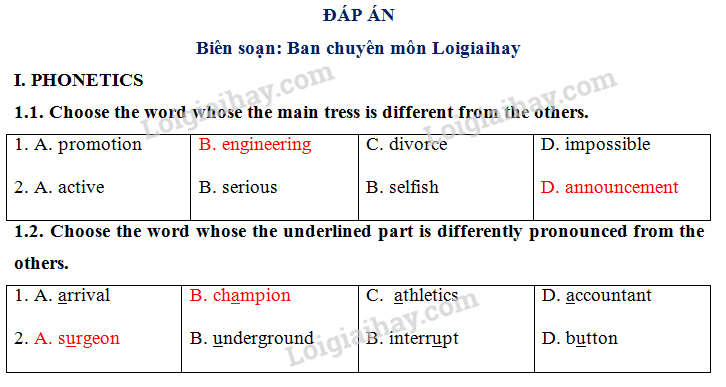
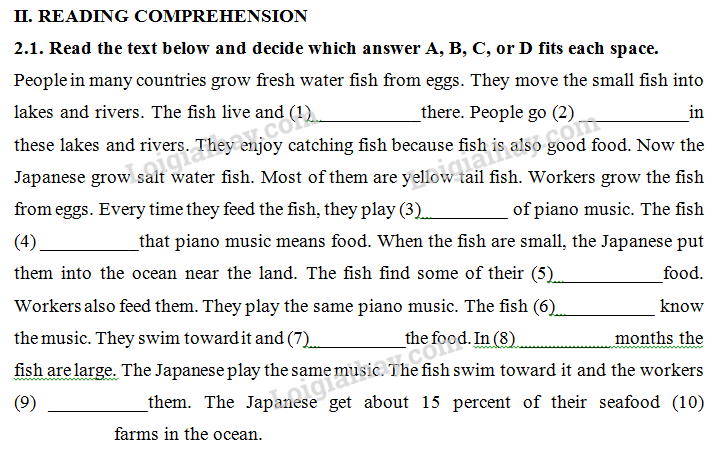
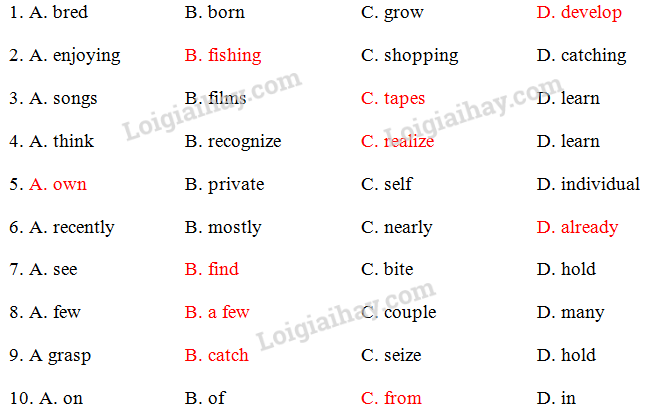
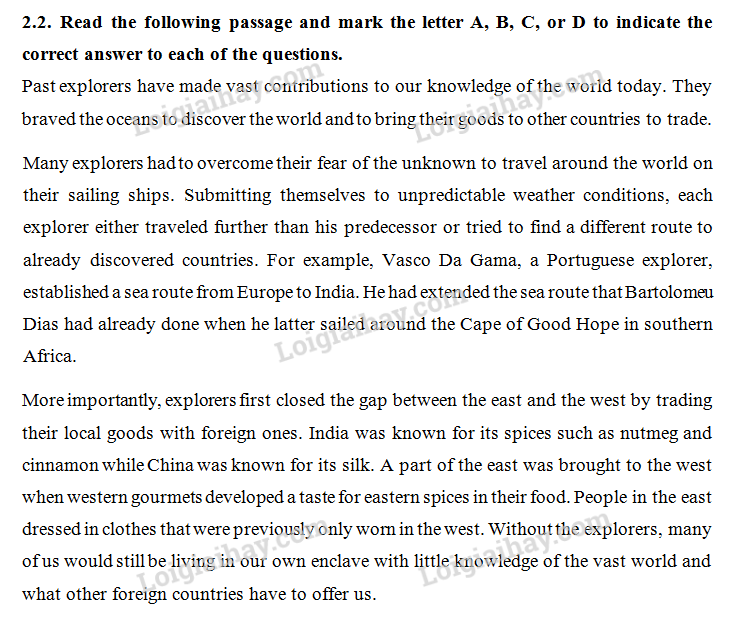
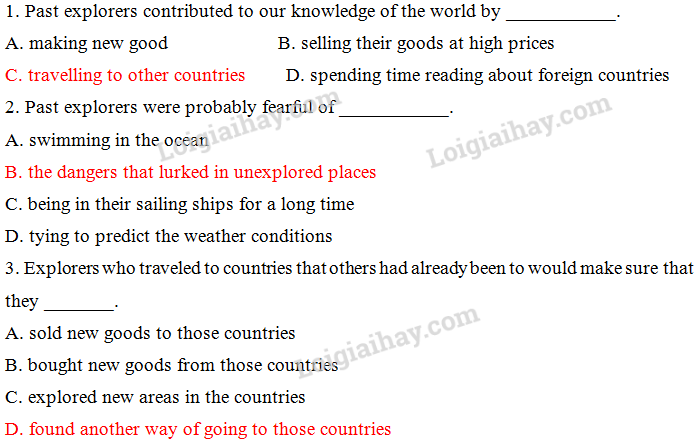
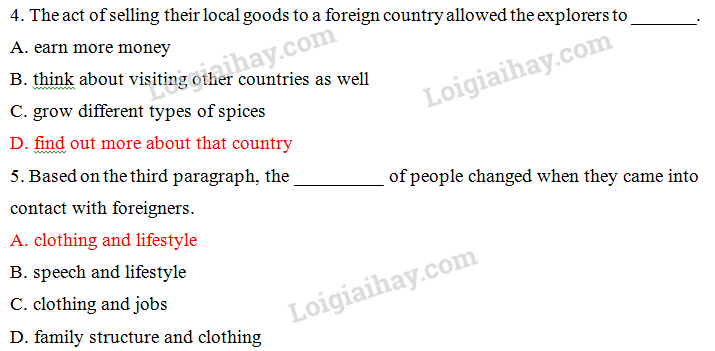
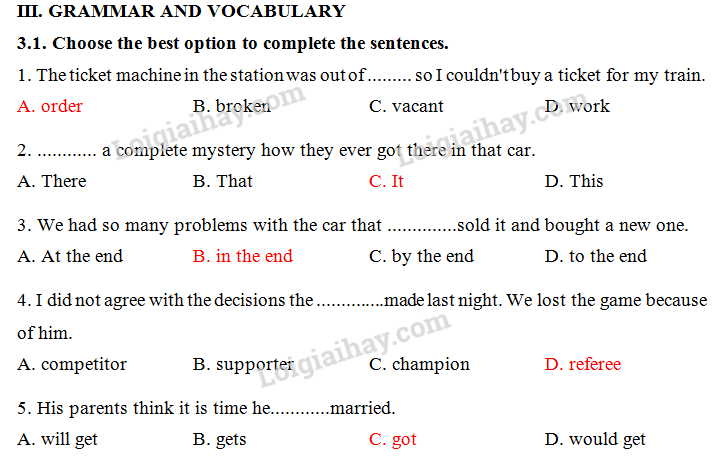
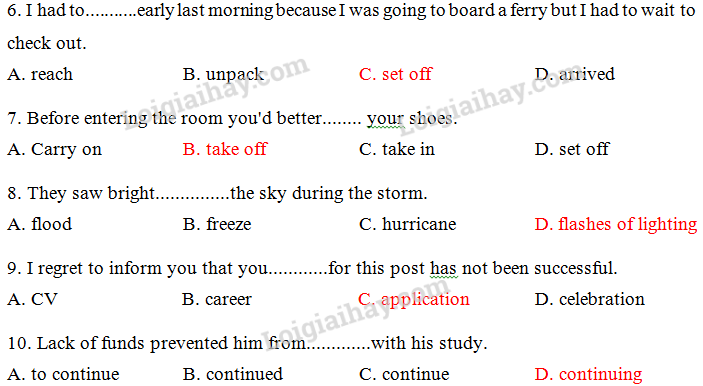
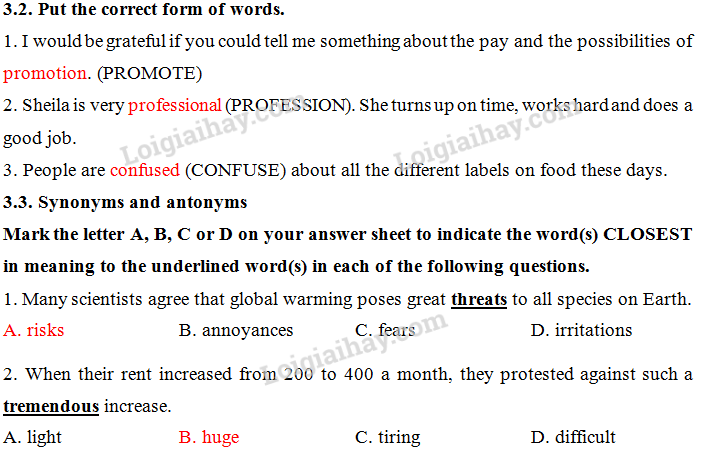

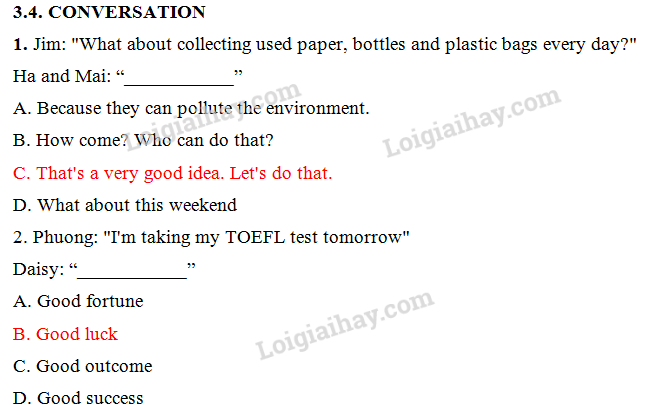
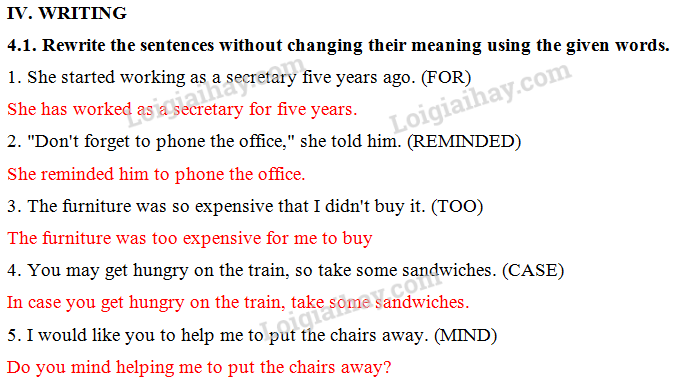
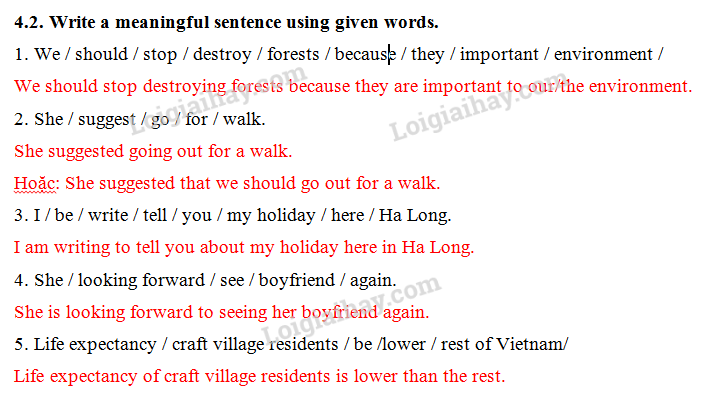






Danh sách bình luận